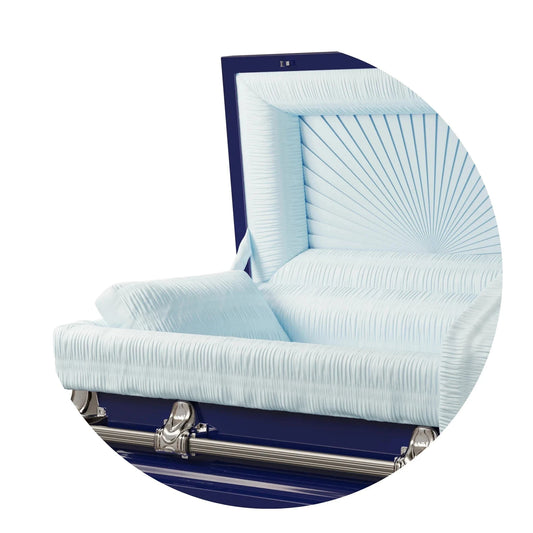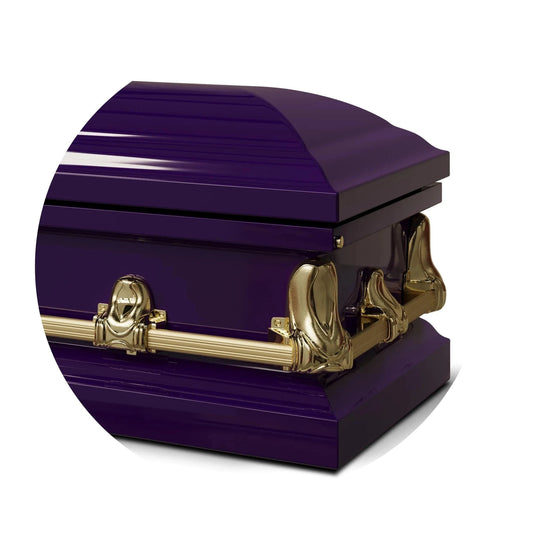If you’ve never attended a funeral before (or even if you have attended one), you may have some questions about the process. Of course, each funeral is unique and your participation in it is dependent on your relationship to the person who has passed; there are certain rules of etiquette that apply to nearly every circumstance, however - before, during and after the event.
Before The Funeral
Decide if it’s right to go. The first question you should ask yourself is whether or not it is appropriate for you to attend someone’s funeral. While this may seem like an odd thing to consider, it’s important to understand the effect your presence could have.
Generally speaking, you don’t need to receive a formal invitation to attend a funeral, and grieving families appreciate the support your attendance provides. But if there is a chance that your being there might upset the family for any reason, then it’s best to steer clear.
Send flowers (or a card). Whether you choose to send them to the deceased’s family or to the funeral home, flowers are a lovely way to convey your respect. Of course, a simple card can be just as caring; keep your writing brief and focus on how much you’re thinking of the family during such a difficult time. Dropping food off at the family’s home is another great way to support those who might not be up to cooking, too.
During The Funeral
Arrive early. The last thing you want to do is interrupt a funeral service by getting there late. Be sure to arrive at least 10 minutes beforehand in order to get settled and avoid potential disruption.
Respect the seating arrangement. In a seated funeral service, the first two or three rows of seats are typically reserved for family and intimate friends of the person who has passed. You should base where you sit on the closeness of your relationship with the deceased and his or her family.
Dress conservatively. While all black is no longer a requirement, standard funeral dress code etiquette still exists; this is not the time to wear casual clothing like shorts or jeans, and anything overly revealing is a no-no. Stick to muted tones and err on the side of formality.
Don’t bring small children. Older kids may appreciate having the opportunity to honor a beloved family figure. Very young children will have trouble understanding the purpose of the occasion, however, and may also become restless during the service. If you can, ask someone to look after small children at home so that you can focus your attention on the funeral and not feel stressed out about keeping kids quiet and entertained.
Turn your phone off or silence the ringer. Avoid looking at your phone during the service; reading or texting will be construed as insensitive by others, even if you think you’re being discreet. If you need to answer a call or a text, leave the service beforehand.
After The Funeral
Be moderate. Many funeral services are followed by a reception, where friends and family members can gather together to reminisce and celebrate their loved love in a more relaxed atmosphere. These gatherings typically include food and drinks. While it’s perfectly fine (and encouraged) to partake in some refreshment, be sure not to overindulge, particularly with regard to alcohol. Now is definitely not the time to drink too much and risk doing something you might regret later.
Stay in touch. One of the hardest things about losing a loved one is coping with the sadness that remains once funeral-related events are over and everyone has gone their separate ways. It’s important to check in with those who are grieving and to let them know you’re there for them in the weeks and months after their loved one has passed.
Funerals can be emotional occasions, and it’s easy to feel nervous about doing and saying the right thing. But by following a few basic rules of etiquette, you can provide comfort and support to a grieving family when they need it the most.
Do you have other questions about funeral etiquette? Titan Casket is dedicated to providing you with the answers you need. Let us be your trusted ally in planning the funeral you want at an affordable, fair price. Contact us in the chat window or here to get started.
5 Jewish Funeral Etiquette for Non-Jews
Attending a Jewish funeral can feel unfamiliar, especially for non-Jews. However, understanding and respecting certain customs is key to ensuring your presence brings comfort rather than confusion. Here are five essential points of Jewish funeral etiquette for non-Jews to help you navigate this solemn occasion with grace.
-
Modesty in Attire
Jewish funerals are deeply rooted in tradition, and conservative dress is expected. Unlike more relaxed modern funeral customs, dark, modest clothing is important. For women, covering the shoulders and avoiding short skirts is vital, while men may be encouraged to wear a kippah (head covering) if provided at the service. -
No Flowers, Please
Sending flowers is a common gesture in many cultures, but it’s not a traditional practice in Jewish funerals. Instead, it’s more appropriate to donate to a charity in the deceased’s name or to the family’s chosen cause. This is seen as an act of tzedakah (charity), which aligns with Jewish values. -
Respect for Religious Rituals
During a Jewish funeral, prayers such as the Kaddish (the mourner’s prayer) may be recited in Hebrew. While non-Jews are not expected to participate in religious practices, it’s important to remain quiet, respectful, and attentive. Observing these rituals in silence is a mark of respect for the deceased and their family. -
The Shiva Custom
Shiva is a period of mourning that typically lasts seven days following the funeral. During this time, the family gathers at home to grieve, and visitors may come to offer condolences. If attending a Shiva as a non-Jew, it’s essential to keep the visit brief and offer your support quietly, avoiding unnecessary distractions. -
Food Considerations
It’s best to avoid bringing food unless specifically requested by the grieving family. When food is involved, it’s important to respect dietary laws that may be in place, such as kosher restrictions. If you're unsure, it's always wise to ask before making assumptions about what’s appropriate to bring.
What Not To Do at a Funeral
Funerals are deeply emotional events, and it’s crucial to conduct yourself with sensitivity and awareness. To avoid unintentionally offending the grieving family, here are five things not to do at a funeral:
-
Bringing up unrelated topics
Funerals are a time for reflection on the life of the deceased, so avoid bringing up unrelated matters or engaging in casual conversations that distract from the solemnity of the event. Focus on offering your condolences or simply being present. -
Forgetting to offer condolences
Even if you find it difficult to express your feelings, not offering condolences can be perceived as uncaring. A simple, heartfelt “I’m so sorry for your loss” goes a long way in showing empathy. -
Interrupting the service
Whether through loud whispers, coughing, or other disruptions, interrupting a funeral service shows a lack of respect for the moment. If you’re feeling unwell or need to step out for any reason, do so quietly to avoid distracting others. -
Overstaying after the service
Some funerals are followed by receptions or gatherings, but it’s important to gauge when it’s time to leave. Lingering too long can be uncomfortable for the grieving family, especially if they are exhausted or not ready for extended social interactions. -
Offering unsolicited advice
Funerals are not the time to give advice on coping with grief, unless specifically asked. Everyone processes loss differently, and offering advice can come across as insensitive, especially when emotions are still raw.
What Not To Wear To A Funeral
Knowing what to wear to a funeral is critical, as it shows respect for the deceased and their loved ones. Here are five things you should not wear to a funeral:
-
Bright, flashy outfits
While the days of mandatory all-black attire are largely over, bright colors or overly flashy outfits are still inappropriate. Stick to muted tones like black, gray, navy, or brown to show respect. -
Overly casual clothing
Jeans, t-shirts, and casual shoes like sneakers or flip-flops should be avoided unless the family has specifically requested a more casual dress code. Funerals typically call for formal attire that conveys respect and solemnity. -
Revealing or tight-fitting clothes
Funerals are not the place for revealing or tight-fitting attire. Avoid short skirts, sleeveless tops, or low-cut clothing. Instead, opt for conservative, loose-fitting outfits that show modesty. -
Excessive accessories
Bold jewelry, large sunglasses, or flashy handbags can distract from the solemnity of the occasion. Opt for simple accessories that don’t draw attention to yourself, keeping the focus on the funeral proceedings. -
Heavy makeup or strong fragrances
Funerals are enclosed events, often held in small, intimate spaces. Heavy makeup or strong perfume can be overwhelming in such settings. Keep your appearance subtle and understated, with minimal makeup and light or no fragrance.
Related Reading: Funeral Attire For Men - What to Wear To A Funeral For Men?
FAQ Section
-
What are the do's and don'ts of a funeral?
Answer: Do: Arrive on time, offer condolences, and dress modestly. Don't: Engage in loud conversations, interrupt the service, or wear overly casual attire.
-
What is disrespectful at a funeral?
Answer: It’s disrespectful to arrive late, talk loudly during the service, use your phone, wear inappropriate clothing, or take photos without permission.
-
What can go wrong at a funeral?
Answer: Several things can go wrong, such as being late, causing distractions, forgetting to offer condolences, or dressing inappropriately. Showing sensitivity is key.
-
What is superstition in funeral?
Answer: Funeral superstitions differ by culture. Common superstitions include avoiding looking at the deceased’s body for too long or covering mirrors to prevent the soul from getting trapped.
Conclusion
Funeral etiquette is about showing respect, compassion, and understanding toward the grieving family and the traditions surrounding the event. Whether it's knowing how to dress appropriately, understanding Jewish funeral etiquette for non-Jews, or avoiding common faux pas, following these guidelines will ensure that your presence is both respectful and comforting. Always remember that funerals are moments for quiet reflection, offering support, and respecting the customs of the family involved.
By understanding funeral visitation etiquette and observing traditions, you can participate meaningfully in a way that provides solace to those grieving.
Plan Your Farewell with Grace – Our Pre-Planned Caskets Offer Peace of Mind
At Titan, families can find nominal, high-quality caskets and urns with full customization options. And with Titan Concierge, you get personalized planning services designed to fit your budget and priorities. Our goal is to take the stress out of planning so you can focus on what truly matters, honoring your loved one’s memory.
Contact for free expert advice at Titan Concierge today to learn how we can help you save money while planning a dignified farewell.

![Upgrade to Premium Weight [18-gauge steel]](http://titancasket.com/cdn/shop/products/casketthicknesswithnumbers.png?v=1680642906&width=533)









